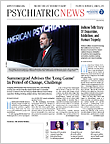Posttraumatic stress disorder (PTSD) is not just another term for shell shock, Sir Simon Wessely, M.D., Ph.D., said last month at APA’s 2015 annual meeting in Toronto.
Both the symptoms of the two disorders and the context in which they arose are different, said Wessely, a professor of psychological medicine at the Institute of Psychiatry at King’s College London and president of the Royal College of Psychiatrists.
“British soldiers entering the trenches in France a century ago were physically, psychologically, and socially different from their counterparts today,” Wessely explained. Given these differences, it should be no surprise that how soldiers react to war might also change.
“Shell shock was not just a description of a particular syndrome, restricted in time and place, but it was also a perfect metaphor for the dominant mode of warfare in WWI—the massive artillery bombardment—and the impact of the shell on the body, the mind, on society, on culture,” he said.
Shell shock was initially perceived as a limited, acute condition, treatable with rest and the minimal psychotherapy of the day. But soon, it became clear to the British high command that too many men experiencing shell shock needed to be evacuated from the front lines. As the asylums began filling up, the wave of patients was blamed on genetics or bad upbringing or character failures—anything but the horrors of the war itself. By 1916, the very term “shell shock” was banned.
When World War II began two decades later, the British government decided that the term would remain banned and that no soldier would be discharged from the army for the condition or granted a war pension for psychiatric illnesses, said Wessely.
It would take yet another war for researchers to start looking more closely at how individuals react to combat or other trauma. According to Wessely, PTSD grew out of the Vietnam War and was just as controversial in the years that followed that conflict.
To compare the two conditions, Wessely and his colleague Edgar Jones, Ph.D., combed through requests for compensation by 600 World War I British soldiers diagnosed with shell shock. The men described symptoms commonly associated with neurological disorders, or what today might be called conversion reactions. They also complained about low mood, depression, insomnia, frequent weeping, and nightmares, but only one or two mentioned anything like the flashback—a core symptom of PTSD.
“Today, 60 percent of modern war pension files refer to flashbacks,” he said. “And we see almost no cases today [among British troops who fought in Iraq or Afghanistan] of the acute classic shell shock presentations.”
Disorders change in all areas of medicine because of the impact of cultural changes, Wessely explained.
“This is a reminder of how fascinating psychiatry is and why psychiatry is so much more interesting than neurology or cardiology,” said Wessely. “Because we have to take into account not just what happens in Iraq or Afghanistan but also what happens in the societies people are returning to, the expectations they have of care, the ways health care is provided, as well as changes in the nature of war itself and the reasons for fighting the war.” ■
A video interview with Sir Simon Wessely, M.D., Ph.D., can be viewed
here.

